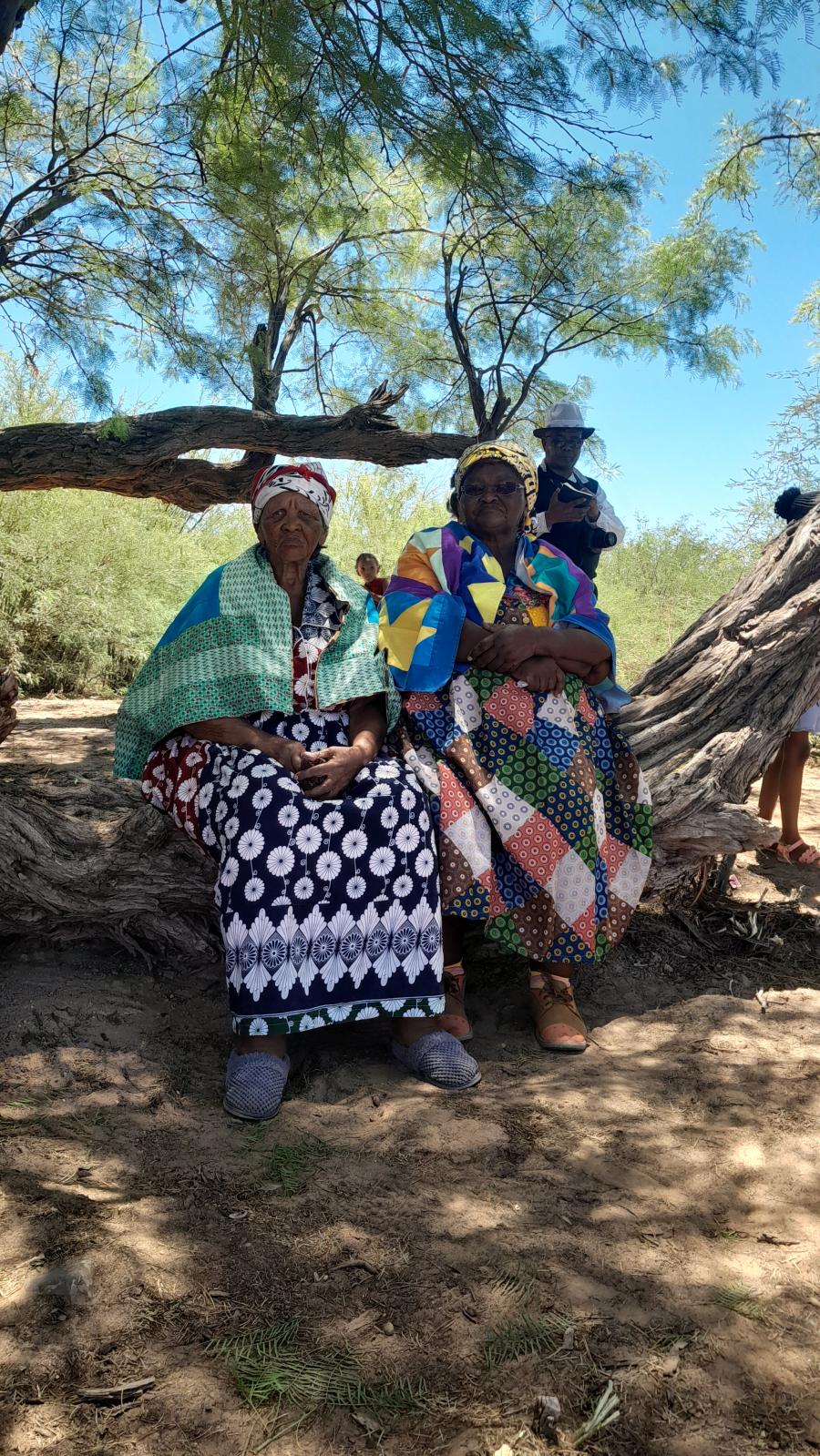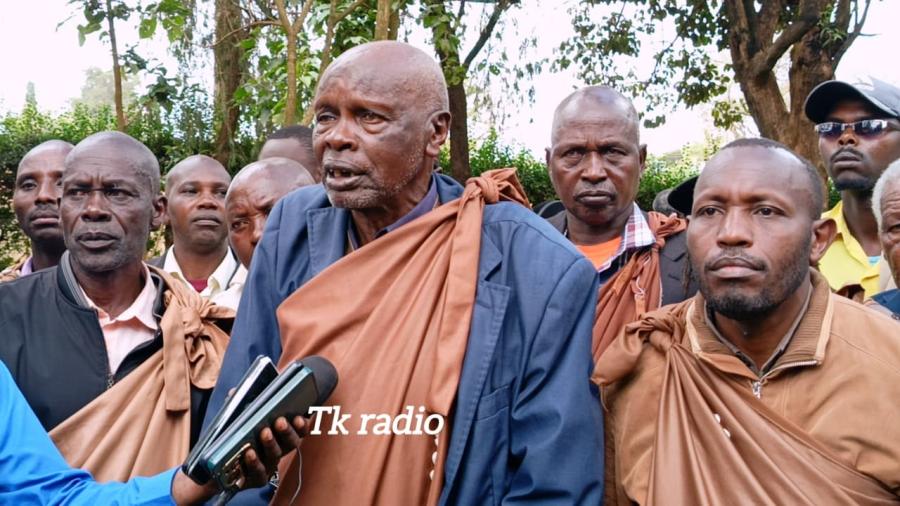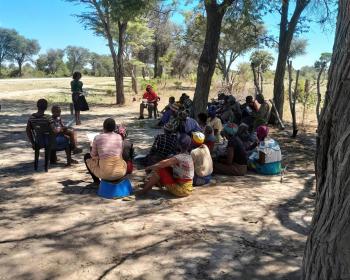When anthropologists work in the field for extended periods, they live with and form ties with individuals who become more than mere representatives of their culture. Some of these relationship are deep and lasting. It is rare, however, for those individuals to filter through the ethnographies, the ponderosity of papers and documentary film, to become real people for the rest of us. There are, of course, exception: N!ai, N#isa, Ongka, Ogotomele, Dedeheiwä and #Toma.
#Toma is known to students and teachers of anthropology and to the general public through the writings of Lorna Marshall and Elizabeth Marshall Thomas and the films of John Marshall. He was unique, not because of his fame, but in his own right any by any standards - both ours and those of the Ju/Wasi who knew him.
In a society that had no chiefs or central authority, in which decisions were reached by debate and consensus, #Toma was a leader. He was a leader by virtue of his personality traits - modesty and generosity, courage and wisdom - and his skills - as a great hunter, storyteller and, above all, conciliator. His ability to mediate a conflict in the absence of formal legal constraints, and in a society held in the crux of great tension, made him valued and respected.
#Toma was born to, and grew up in, an autonomous and self-sufficient life of hunting and gathering. His death represents the end of that era. He is also a symbol of the rapid and radical changes that Ju/Wasi have undergone in their transition from foragers to farmers and wage earners. It was he who led the first group, the/Gautcha band, into the Namibian government settlement of Tsum!kwe in search of a better life in 1959. When that promise was left unfulfilled, after three decades of decline into poverty, hunger and despair, it was #Toma who started the Ju/Wasi's outstation movement back into the bush to regain their independence and self-sufficiency.
#Toma was much more than the Marshall family expedition's main informant. To John Marshall, he gave his name. When John returned to Nyae Nyae. Namibia, in 1978, after an absence of 20 years, #Toma said, "A friend is someone you like. We're old folks together. We're friends." And when John was leaving, he said, "Tell them that #Toma is getting old. Tell them that your big name' is old and may be gone when you get back. He's old and small. Tell them when you return you may only see the young people."
But #Toma lived for 10 more years, during which his family group and 10 others left the slum at Tsum!kwe to resettle in their traditional n!ores (territories). #Toma was able to die peacefully in his skerm in the bush instead of in a tin and concrete hut in Tsum!kwe.
When McIntyre first came, he found us at Gura in the writer. He talked to us strongly and said he was going to make a settlement at Tsum!kwe and we should come and help him. He said he was going to teach us new things like gardening and working for money and raising goats, and teach us to live in one place. He said our children would go to school and someday he would bring us cattle. He left us with out thoughts. At first we didn't want to go to Tsum!kwe but we talked about it and decided it was a better life for us and we should learn to live like other people. So we came to Tsum!kwe in the hot season before the rains. - #Toma, 1980
#Toma is a man of uncommon intelligence, decisiveness and force, skill in hunting, perception in human relations and probity. Not only do members of his own band look to him, but neighbours and visitors do also. We looked to him for advice and support in making all our plans and decisions. - Lorna Marshall, 1976
"Where have these white men come from?" I asked myself. "They are not like other whites." I just sat and watched you all for a while. We slept some nights and then you all began to work. Your mother began her work. They all went to the shade of a baobab tree. Your mother had food with her and fed people. Your mother worked on papers...We said, "what kind of a white woman is this who thus works?" - #Toma, 1978
My father did everything for me and now he has gone. So my mother and I are going to be crying aloud for him a long time. - Bay, #Toma's youngest daughter, 1988
Since #Toma has died the rest of us are just small children left here in the village. It's important for us not to fight - we have no more old man any more to tell us what to do. - Nai, cousin
My father-in-law the one who "made me live here." Even though he has died I will stay here in his n!ore. My great-great-grandfather died here and why should I live somewhere else? Only death will separate us. Nothing else could. - //Ushe, daughter-in-law
When I first married I was still a young child. #Toma nourished me. He would kill met and give it to me. He would cook food and give it to me just like his own children - //Ushe, daughter-in-law
I am in pain. Sometimes I say to myself this is just the way the sky does things. And then I feel a little better, but then I start to feel bad again. All these weeks since he died we've cried for him. We may leave off crying when the rains come. -Bi//Au, daughter
Here is where our father's footsteps stopped. Since he has died we don't know where we'll go. None of us is going anywhere else.
#Toma would tell us not to do certain things because they were senseless. He would urge us to have our own sense. That's how I remember him. When he spoke you would listen well to him. He had sense and you would hear his thoughts and think them yourself and know they were good. Now that he's gone it seems that people are forgetting the sensible things he told us. - N//Aba, cousin
He would never insult anyone or pick a fight. His heart was good toward people. - Nai, cousin
#Toma had a head for hunting. #Toma was the one who could shoot giraffes. He was the owner of hunting. Everyone said the giraffes belonged to him. He was the one who brought home meat. Even when he was exhausted he would walk from Tsum!kwe like it was nothing. Now I ask you, if there is no car, how many kilometers is it from Tsum!kwe to Gautcha? [45 km] He and the old lady were just alike. His wife !U N!ani, son-in-law.
Article copyright Cultural Survival, Inc.



